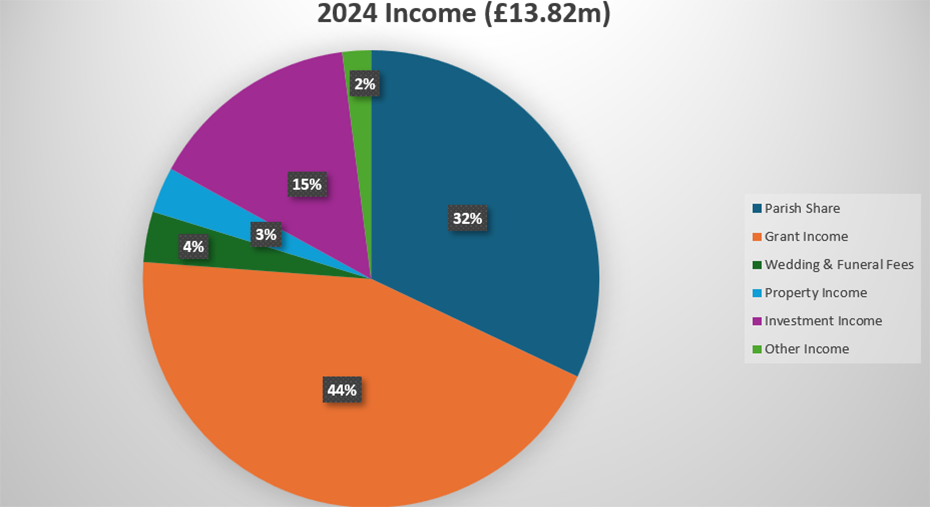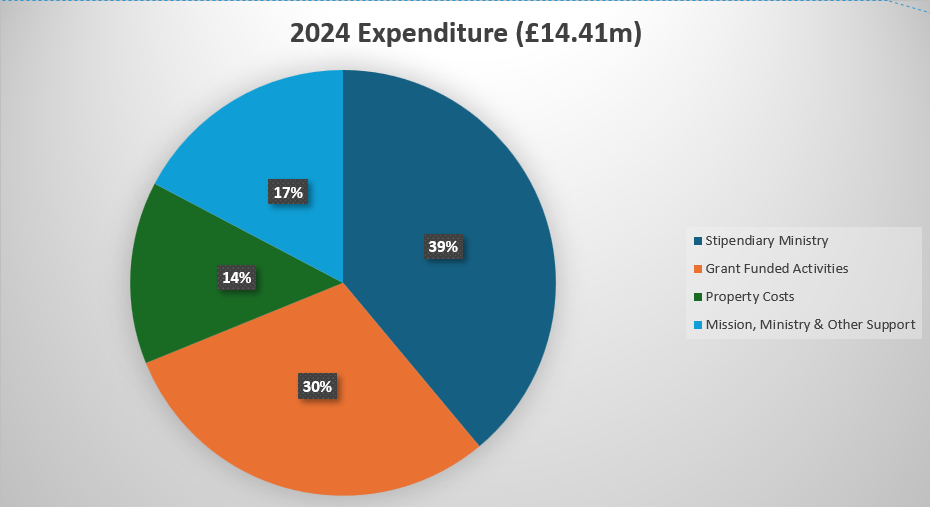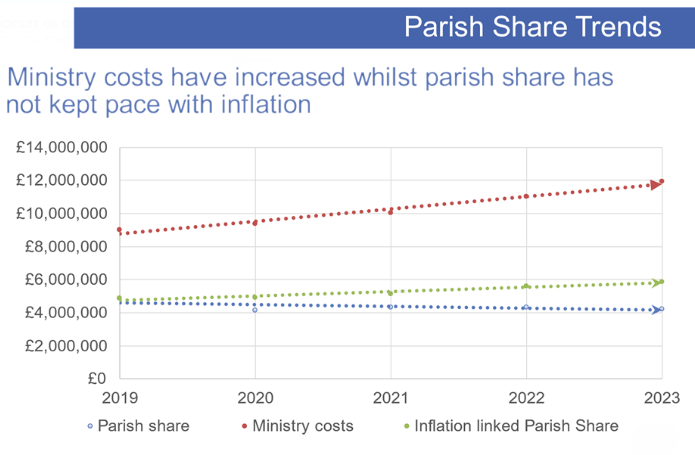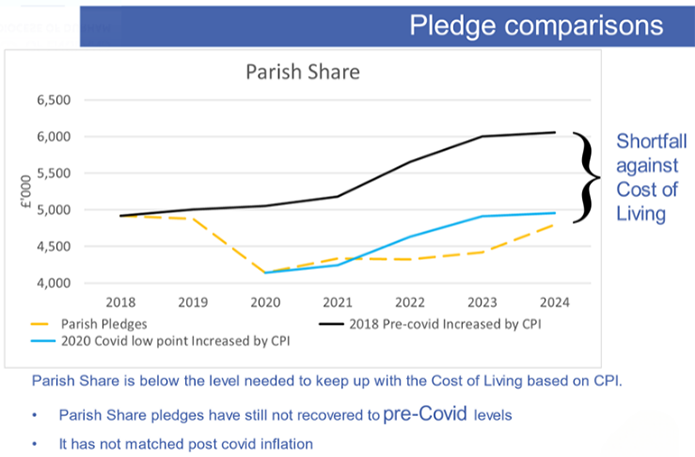What is Parish Share?
Parish Share is the income given by all parishes towards resourcing the mission and ministry of the Church of England in the Diocese of Durham. It’s a commitment from every congregation to ensure that the work of the Church, of which we are all a part, reaches into every community, helping us to reflect God’s own abundant generosity as every parish gives, and every parish receives.
Why is Parish Share important?
The Revd Tim Wall (Hetton Lyons with Eppleton) explains why he believes parish share is vital to mission and ministry across the Diocese.
Diocesan Budget 2024
 |
 |
What impact does Parish Share have on the budget?
 |
 |
An Excel spreadsheet containing the Guided Pledge calculation can be download here.
What is Guided Pledge?
Different dioceses in the Church of England employ differing methods to communicate the level of support needed from parishes to provide the cost of ministry and diocesan support. Some will send an invoice to parishes based on an allocation by the diocese, while others will use a free-pledge parish share system where no invoices are issued but every parish is asked to make a generous pledge based not only on what it considers to be an appropriate amount, but also on a commitment to deliver this.
In our Diocese, as the value of parish share had declined by 30% in real terms since 1994 Bishop’s Council recognised that a long-term solution was required, so introduced the Guided Pledge System (GPS).
The GPS remains pledge based, meaning each parish is still free to decide what it chooses to contribute. However, PCCs are guided by a figure calculated using the data associated with each parish. The data used is:
- The Indices of Multiple Deprivation (IMD) score of the parish
- The stipendiary ministry allocated to each parish in their latest Deanery Plan
- The people in the parish (usual Sunday attendance, electoral roll, population)
- The financial resources of the parish
More information on where these figures come from can be found towards the end of this page.
Further details on how Guided Pledge is calculated, the safeguards in place and information on the cost of ministry in our Diocese can be found in the Guided Pledge Review document.
Please ensure you share this information with your PCC and congregation in advance of meeting to decide your Parish Share pledge this year to allow an informed choice to be made.
How do we submit our Guided Pledge?
After the PCC have met to discuss the Guided Pledge figure they need to submit their Pledge to the Diocese before the deadline of 1st October. This year we are asking each parish to submit their pledge on a dedicated form - please click here to access the form, which should take less than 5 minutes to complete.
This will capture all the relevant data, and act as a starting point for our PCCs not just consider how much we are able to offer in parish share, but how we intend to meet that pledge across the year.
Why does the form ask how and when we will pay our Parish Share?
Deciding on a regular pattern of Parish Share payments is important for a number of reasons, not least because the Diocese pays clergy stipends on a monthly basis. As you can see from the budget figures above the Diocese currently runs at a deficit, and only holds one to three months of reserves at the best of times so regular payment of pledges is vital to the provision of ministry and mission in our parishes.
How do we pay our Parish Share?
You can instruct your bank using a bank mandate to make regular payments direct to the DBF from the PCC’s bank account. Please quote your parish unique reference number available on the list here.
Further information on how the Guided Pledge is calculated
- The Indices of Multiple Deprivation (IMD) score of the parish – this is based on data collected through the National Census, mapped to parishes by the Church Urban Fund
- The stipendiary ministry allocated to each parish in their latest Deanery Plan
- The people in the parish (usual Sunday attendance, electoral roll, population) – like the IMD data, parish population comes from the Census. The electoral roll and usual Sunday attendance figures come from data entered into the Statistics for Mission (SFM) return completed by each parish
- The financial resources of the parish (annual income and reserves averaged over recent years) – this comes from the Return of Parish Finance (RPF) completed by each parish.
These figures are always based on the most recent available, that is the IMD and population comes from the latest reports released by the Church of England Statistics Unit and the Church Urban Fund, while the SFM and RPF data are based on the latest data provided by the parish. For example, the Guided Pledge calculated for 2024, which parishes will consider during October 2023, will be based on their SFM and RPF for 2022.
These numbers are loaded into the formula each year, the calculation is then run and an Unadjusted Guided Pledge (UGP) is created for each parish. The calculation is such that the sum of these UGPs is what the diocesan budget requires to fund ministry over the forthcoming year.
However, three safeguards are applied to produce the final Guided Pledge:
- if the UGP is higher than 65% of the parish’s annual income, and the parish has less than 12 months' income in Unrestricted Reserves, the GP is capped at 65% of the parish’s income.
- If the UGP is less than the parish’s actual contribution in the previous year, the GP is adjusted to last year’s contribution plus an inflationary increase so that the pledge remains the same in real terms. This reflects the ‘mutuality’ by which parishes that are able to give more than the pledge would require are able to help contribute to the share of those who are unable to meet the guided pledge.
- If the UGP is more than 200% of the ministry cost (see appendix 2 of the 2023 Guided Pledge Review) of a parish, the pledge is capped at this level. This reflects that whilst mutuality is encouraged, there is a limit to how much can be expected of parishes which also need to invest in their own work.
- Otherwise, the GP is the calculated UGP.
